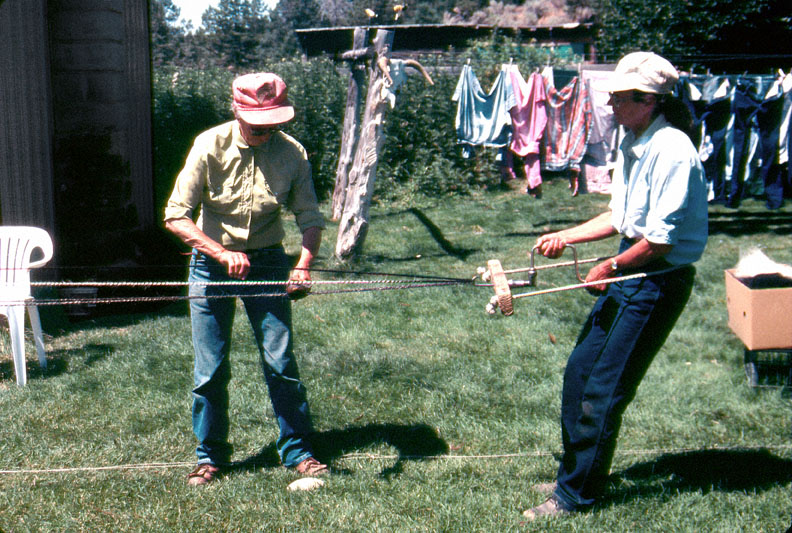- Catalog No. —
- S 13-1003
- Date —
- July 27, 1998
- Era —
- 1981-Present (Recent Oregon History)
- Themes —
- Arts, Folklife
- Credits —
- Oregon Historical Society Folklife Program
- Regions —
- Oregon Country Southeast
- Author —
- Lynn Hadley
Frankie Dougal and Ropemaking
This photograph, taken by Lynn Hadley on July 27, 1998, shows Frankie Dougal (left) and her daughter, Charlene Standford (right), twisting strands of horse hair into rope. Hadley interviewed Dougal for a traveling exhibit project titled Traditional Arts of the Oregon Country (TAOC). The TAOC exhibit was curated by the Oregon Historical Society Folklife Program and traveled throughout Oregon from December 1998 through December 1999, moving monthly between rural libraries.
Frankie Dougal was born into a ranching family in Jordan Valley, Oregon in 1918. When she was nine years old, her mother taught her how to make rope from horse hair. As a young woman, her mother had learned the rare skill from a vaquero―often referred to as a “Mexican cowboy”―while working at the Five Bar Ranch along the Owyhee River. Frankie, in turn, taught her two daughters the craft of making horse-hair rope when they were young girls because, as she states, “they should keep up tradition.” Like her parents, Frankie Dougal has been a lifelong rancher, although her own ranch―“a cow and calf operation”―is just across the Oregon line in Idaho’s Owyhee County.
To make the ropes, Dougal first collects mane-hair from her horses. She washes, combs, and hand picks the best hair before spinning out 70-foot strings using a century-old, manually-powered “McCartie machine.” After those strings are spun, she or one of her daughters uses a harness to work them together into either a hackamore (22-feet), a snafflebit rope (18-feet), or a fidore (17-feet). All three ropes are used by horse riders.
When Dougal was in her mid-twenties, she began selling her ropes commercially. The high quality of her ropes has drawn her business from around the world―particularly from buyers who compete in horse shows. According to Dougal, “As long as the dogs don’t chew them, they’ll last a long time. I still use ropes that my mother made.”
Written by Joshua Binus, © Oregon Historical Society, 2005.
